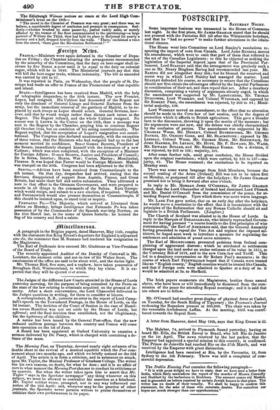Miscellaneous.
A paragraph in the Belgian papers, dated Hanover, May 15th, couples with the statement that King Ernest's departure for England is adjourned sine die, the statement that M. Rumann had tendered his resignation to the Magistrates.
The Earl of Dalhousie is to succeed Mr. Gladstone as Vice-President of the Board of Trade.
The recently appointed Auditor of the Dutchy of Cornwall is Mr. Lockhart, the eminent critic and son-in-law of Sir Walter Scott. The emoluments of the office are said to be about 400L, and the duties light.
Mr. Thomas Bird, five sons, and a nephew, have taken possession of Brougham Hall, Westmoreland, to which they lay claim. It is ex- pected that they will be ejected vi et armis.
The Judges of the different Law Courts attended in the House of Lords yesterday morning, for the purpose of being consulted by the Peers on the state of the law relating to criminals acquitted on the ground of in- sanity. After a short conversation, the Lord Chancellor delivered to the Judges questions in writing, for them to consider at leisure.
A correspondent, R. B., corrects an error in the report of Lord Camp- bell's speech on the Tow nshend Peerage, in the House of Lords, on the 2d instant. The decision of the Court of Session in the case of Hamil- ton versus Hamilton was not set aside by the House of Lords, but affirmed; and the final decision thus established, not the illegitimacy, but the legitimacy of the children.
A notice has been issued by the General Post-office, that the new reduced uniform postage between this country and France will come into operation on the 1st of June.
A Board has been appointed at Oxford University to examine a sermon delivered by Dr. Pusey, which is charged with containing a de- fence of the mass.
The Morning Post, on Thursday, devoted nearly eight columns of its double sheet to the revival of a musical squabble which the Post com- menced about two months ago, and which we briefly noticed on the 22d of April. The article is in form a criticism, and in substance an attack, upon Mr. Taylor, the Musical Professor of Gresham College. The writer has his own reasons, no doubt, for what he does ; and it is no affair of ours in what manner the Morning Post chooses to conduct its criticisms or its quarrels. But when the writer takes upon him to assert that Mr. Taylor " says in the Spectator newspaper" any thing whatever on this subject, we must be allowed to contradict his assertion as a falsehood. Mr. Taylor neither wrote, prompted, nor in any way influenced our notice of the 22d April: and, whatever may be the practice of other journals, the Spectator never permits writers to praise themselves or criticize their own performances in its pages.


























 Previous page
Previous page